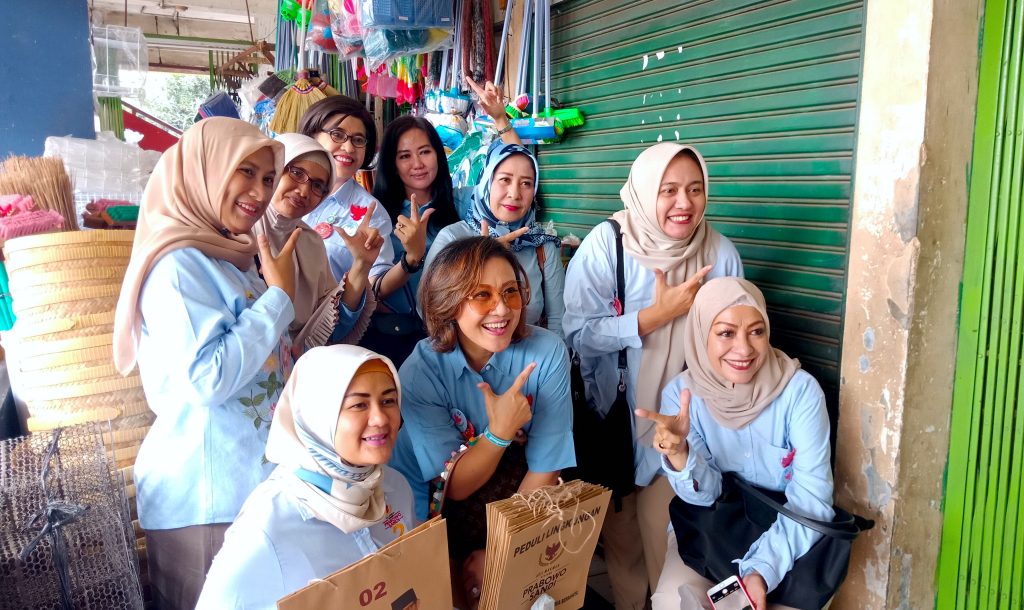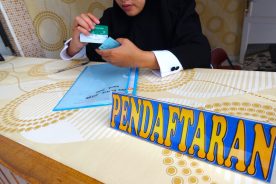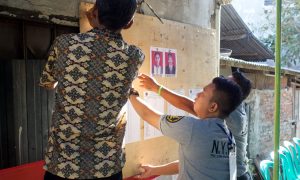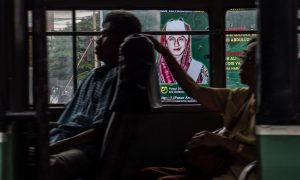“If Jokowi wins, there would be no azan [the Islamic call to prayer], no Qur’an study circle for children, no veil [for women]; women can marry other women, men with other men”, said three women during a door-to-door campaign in Karawang, West Java. They were members of PEPES, a volunteer organisation made up of the Prabowo Subianto–Sandiaga Uno campaign’s boldest women supporters. After a video of their door-to-door campaigning emerged, the local police investigated the women for spreading “hoaxes” and “black campaigns” in violation of the UU ITE (Electronic Transactions Law). The story became a focus of public debate about women’s participation—and how that participation is being instrumentalised—in Indonesia’s 2019 election campaign. In particular, it has put the spotlight on one group of key protagonists in this election: Indonesia’s emak-emak.
Who are the emak-emak, and why is there such a buzz surrounding them? The term, derived from the word for “mothers” in Jakarta’s Betawi dialect, refers to middle-class women—tough, resilient, and stubborn in doing what they believe to be right. In the past several years, the emak-emak have become a cultural phenomenon, the stuff of social media memes and viral videos. And thanks in no small part to their increasingly important role in grassroots campaigning, women’s participation has become a central talking point in Indonesia’s 2019 presidential race.
Vice-presidential candidate Sandiaga “Sandi” Uno has made use of the emak-emak’s popularity in popular culture to engage with women voters, declaring that that: “We want to fight for emak-emak, we want goods to be affordable”. In response, President Joko Widodo (Jokowi)’s campaign team created a more formal name for their women’s groups: Ibu bangsa—literally “mothers of the nation”. And so began the attempt to target women voters in new and unconventional ways, with an overtness perhaps never before seen in Indonesian election campaigns.
Women supporters are active in community organisations and have strong social networks, which is why they are considered highly effective foot soldiers in the grassroots campaign. To understand this phenomenon better, I followed some members of women’s partisan groups from both the Jokowi and Prabowo camps as the campaign got underway. I wanted to understand if these female campaigners are a new voice for women’s issues in Indonesia’s democracy, whether they can encourage reforms that are important to women—or whether they are simply being instrumentalised by the predominately-male campaign teams.
Prabowo-Sandi’s emak-emak politics
In August 2018, a group of middle-class women in Jakarta declared the establishment of Partai Emak-Emak Pendukung Prabowo-Sandi (Prabwo-Sandi Emak-Emak Supporters’ Party), or PEPES. The initiative was coordinated by Wulan, who has been a Prabowo supporter since the 2014 election and is a business coach for Oke-OCE, an entrepreneurship program championed by Sandiaga Uno in his capacity as Jakarta’s deputy governor.
PEPES claim to have more than 3,000 members spread across all of Indonesia’s 34 provinces. They are very open for newcomers; anyone can join by filling in an online form or giving their photocopied ID card to other PEPES members. In line with the Prabowo-Sandi campaign’s strategy, they use price instability and limited job opportunities as their main criticisms of the current government. They target the group most affected by these issues: middle to low-income women. They believe even the most apolitical women would demand change when these economic problems are stressed.
Prabowo’s emak-emak are vigorous in targeting Jokowi supporters and the PDI-P heartland in places such as East and Central Java. As the head of PEPES, Wulan, told me:
“We don’t work too hard in Jakarta and West Java. Those are Prabowo’s base areas. We just spread it out within our Taklim circle [Islamic study group] and neighbourhood. In the next two months, we will focus on East and Central Java, the red areas [referring to PDI-P’s party colours]”.
PEPES go door-to-door in kampung and remote areas to publicise Prabowo-Sandi’s programs, talking heart-to-heart with women about how the current administration has not made any improvements to their lives. They avoid using the term blusukan (impromptu visit) because of its association with Jokowi, instead using kepung (keliling kampung or ”going around the kampung”).
They have a very active social media presence, continuously updating on their activities with bold hashtags like #PEPESKepung (“PEPES surrounds the kampung”) and #PEPESDatangKelar (“once PEPES goes to a kampung, everything will be settled”). They act as what Indonesians call “political buzzers”—originally an internet phenomenon, but now a part of in-person campaigning—denying accusations against their candidates and attacking their opponents. They claim that they are followed by intelligence agents and face bureaucratic difficulties when in the field, something which, in their eyes, just confirms their impact in the community. As Wulan said, “…our extensive work has been watched… BPN [the Prabowo campaign’s head office] once called me, asked me to be more careful… They told us that volunteer groups need not report [their campaign plan] to the authorities. But they advised us to do so, considering the local officials who aren’t neutral. It happens only to us; other volunteer groups for Prabowo-Sandi do not encounter such problems”.
PEPES is joined on the Prabowo-Sandi side by other organisations like Gerakan Rabu Biru (GRB), a joint force of 16 partisan groups. GRB welcomes all genders to join, although most active members are women. PEPES often gets invited to their activities but isn’t really comfortable with the movement. Social class is the major reason: GRB targets upper-middle class women who do not share the same experience as the emak-emak. GRB usually holds events in malls and has a different focus when talking about Prabowo-Sandi policy. As PEPES’ Wulan told me: “The unstable price of goods is affecting [GRB members financially] but it is not as severe as our members, that’s why our language [in PEPES] is different [from GRB]”. In spite of the differences, PEPES thinks it is a good strategy, since both teams are able to target different markets.
Prabowo-Sandi’s promises for women
The campaigns are happy to benefit from women’s activism on their behalf. But do they have a meaningful policy agenda for women? Despite Prabowo and Sandi’s claim to be on the side of emak-emak, they don’t explicitly include gender issues in their manifesto. Rather, they emphasise solving economic problems such as price instability and job insecurity to combat gender inequality. Consistent with Prabowo’s campaign priorities, the supposed emak-emak aspiration for stable prices has been accommodated well in the Prabowo-Sandi manifesto.
Other important issues are still left behind. One of the most important of these is protection from violence against women—an issue which has indeed been taken up by Prabowo’s party, Gerindra. Gerindra MP Rahayu Saraswati (Sara) Djojohadukusumo, who has campaigned against the trafficking of women, is one of the most active advocates for the passage of the Elimination of Sexual Violence Bill, or RUU P-KS, which is currently before Indonesia’s parliament. In the debate over the RUU P-KS, Gerindra has parted ways with its coalition partner, Partai Keadilan Sejahtera (PKS). PKS rejects the bill, claiming that it promotes pre-marital sex and same-sex relationships.
This awkward relationship between different factions of Prabowo’s political coalition—some more open to progressive gender policy, others much more conservative—perhaps explains why gender issues are not front and centre of the emak-emak campaign. In an interview, Sara Djojohadikusumo, who is also a Prabowo-Sandi campaign spokesperson, acknowledged these problems:
“Yes, we do not put women’s protection up-front but we will do it regardless… We [Gerindra] cannot push all our agenda to the coalition. We have to pick our battles. I do not want this to be a partisan issue; we all have to work on this. It is beyond political parties, beyond [the] presidential race”.
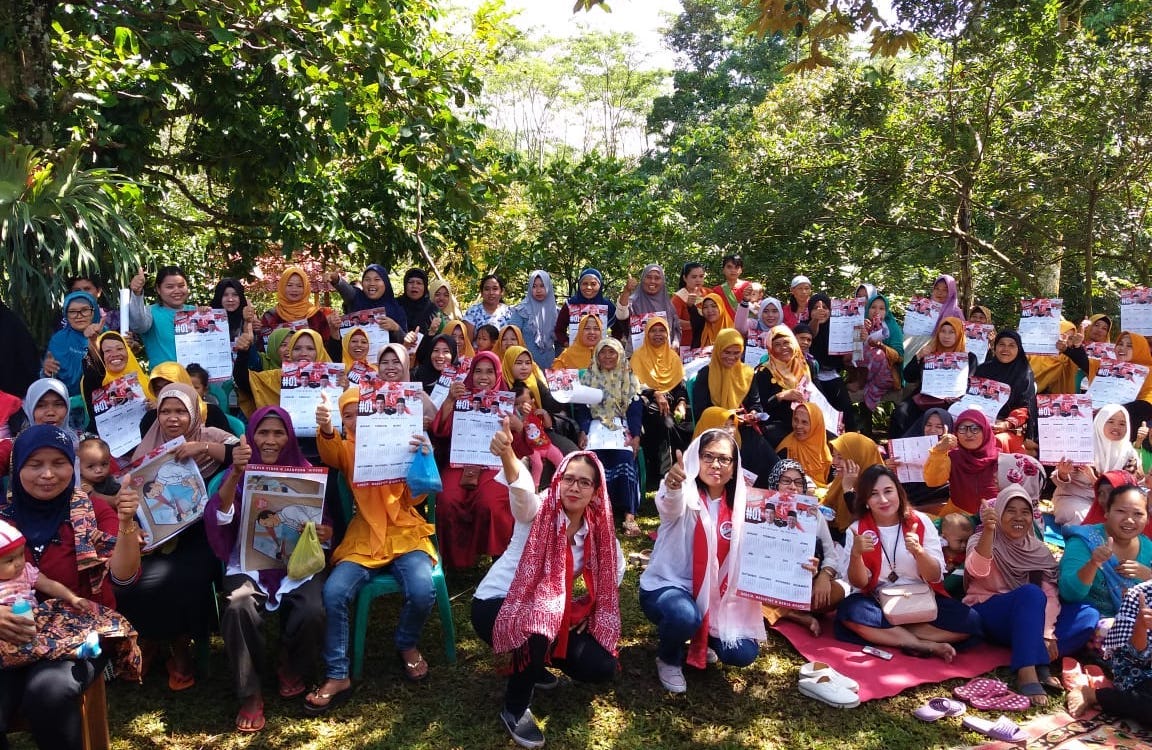
Pro-Jokowi female relawan (volunteers) and their supporters. (Photo: Putri K Wardani, supplied)
Jokowi’s women partisan groups
In contrast to Prabowo-Sandi’s emak-emak, Jokowi’s women’s partisan groups are diverse and sporadically organised, who seemingly campaign on different issues. Jokowi’s national campaign team has established the Directorate of Women Voters Outreach (led by Ida Fauziah, a senior MP from the Nahdlatul Ulama-linked PKB party) that facilitates women supporters across the country. From small groups of 15 or so women to national organisations with thousands of members, these female Jokowi supporters are an eclectic grouping. In an interview, Ida Fauziah claimed:
“It’s all bottom-up! There are so many communities at the local level. Some of them tell us [TKN], then we register them to the election body, but many do not. It springs from their own initiative, we just facilitate them, if they want to know more about Jokowi’s ideas or his character.”
Ida’s directorate has a campaign message for the ideal woman who would vote for Jokowi: perempuan keren, enerjik, relijius dan nasionalis (cool, energetic, religious and nationalistic women). Unlike Prabowo’s emak-emak, they do not use social media as the main tool of the campaign, rather relying on the established network of women to go into kampung.
Some of the pro-Jokowi women’s groups are using more explicit gender perspectives in their appeals to female voters. One of them is the women’s wing of Bravo 5, a volunteer organisation dominated by ex-military networks which was founded by senior minister Luhut Pandjaitan for Jokowi’s 2014 campaign. Bravo 5’s nation-wide women’s wing is led by Luhut’s sister, the feminist intellectual Kartini Sjahrir. Interestingly, this wing explicitly advocates for women’s empowerment and gender-based issues. They argue women should not be limited to domestic chores. At the launch of Bravo 5’s women’s wing, Kartini asserted four reasons to support Jokowi;
“Firstly, the improvement in the basic healthcare, particularly for women reproductive health… [JKN, the national healthcare system] provides free delivery care including pre- and post-natal consultations. Secondly, the free education system assures girls to get an education and prevent child marriage. Thirdly, more opportunity for economic empowerment program for women and assistance for the disabled through Program Keluarga Harapan. Fourthly, agrarian reform that gives more advantage to indigenous women.”
Still, other women’s volunteer groups supporting Jokowi are keeping the focus on economic appeals. Pertiwi, another women’s volunteer group, was founded by Putri K Wardhani, the President Director of the cosmetics company Mustika Ratu. Pertiwi has supported Jokowi since he ran for the Jakarta gubernatorial election in 2012. It targets educated urban women, while distributing social assistance for women at the grass-roots.
The main appeal of Pertiwi’s campaign is Jokowi’s ongoing micro-finance policy, MEKAAR, which helps access capital and open home industries, and claims have helped more than 4 million poor women. For Pertiwi, other problems, like addressing domestic and sexual violence, are not their priority because they have been covered by other organisations.
Jokowi also has the largest Islamic women’s group on his side, Muslimat, the women’s wing of Nadhlatul Ulama. Just recently, Jokowi attended the anniversary of Muslimat, along with 100,000 members and high-profile NU women such as Yenny Wahid and East Java governor Khofifah Indra Parawangsa, both of whom have declared their support for Jokowi.
Jokowi’s team claim that his track record on gender equality has allows him to attract female voters. They highlight the success of the national healthcare system in reducing maternal mortality rates, and the education system which gives equal opportunity for women to pursue education. Jokowi, himself, mentions the number of women ministers in his cabinet to indicate that he is pro-gender equality.
A patronising politics?
We can see then, that pro-Jokowi women’s partisan groups have varied agendas, from health and education services to economic opportunity for women to work from home. Prabowo’s emak-emak, though, are more centralised and promote a more limited but clear agenda of addressing women’s economic issues.
What unites both campaigns, though, is the same old reliance on a discourse that frames predominantly around women’s roles as mothers and housewives. Illustrative of such rhetoric is the section on women’s issues contained in the Jokowi-Ma’ruf Amin manifesto for 2019-2024, which states that:
“Women are key to the country’s success…We should encourage women to have an important position within the family and in society. As the mother of the nation, women educate children, improve the mentality of the nation, guard family morals, and drive the family and society’s economy.”
The feminist scholar Susan Blackburn, in her book Women and State in Modern Indonesia, explores how the New Order propagated the gender roles that are expected of men and women in Indonesia. To be an ideal woman is to be a mother and wife, selflessly supporting her husband’s work while educating children to be a good citizen. Such state gender ideology strips down the woman from a liberated individual into someone whose identity belongs to others: the husband or the children. They could be active in the public domain as long as they represent the family, not themselves. The discourse passes on from generation to generation and, in the case of women, is distilled in the idea of kodrat, or the inherent nature of a woman.
Who’ll pay for Indonesia’s national health insurance?
Politicians need to make some hard decisions to make the system financially sustainable.
The women’s partisan groups themselves betray this tendency. They are advocating on problems that revolve around their role solely as mothers and housewives, such as the price of goods. As a supporter from Prabowo side points out: “Women’s issues are very wide… Our primary concern is the economic balance of households, whereas women’s rights protection comes second”. Similarly, one female Jokowi volunteer said: “We do not include violence against women because many organisations have taken care of it. We went to the field to identify what people need, and it is not one of the concerns that arises”.
The increasing prominence of women’s partisan groups can be celebrated as an example of largely self-generated political engagement on the part of Indonesian women. However, the problems they are advocating for are still stuck within a patriarchal state-propagated gender ideology—one that assumes women’s problems are synonymous with mothers’. More care should be taken by both campaigns to depict women as individuals who have agency, rather than solely in their role in looking after their families. It seems that Indonesia has a long way to go before gender issues become central to candidate debates, policy initiatives, and campaign discourse.
 Facebook
Facebook  Twitter
Twitter  Soundcloud
Soundcloud  Youtube
Youtube  Rss
Rss 